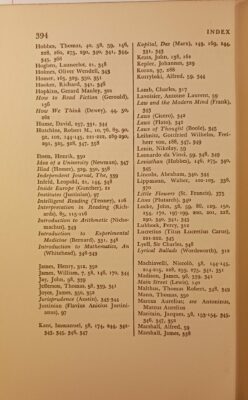Editor's Note
This is part one in a two-part series about indexing. The next entry will be published on Wed., Feb. 28.
While scrolling social media pages awhile back, I found one friend appreciating, in a moment, her current writing project—a book manuscript. The appreciation arose in the context of editing her project’s forthcoming index. I did not inquire closely but I suspect the index review revealed, in a satisfying fashion, the full scale of the book: its characters, events, topics, places, and major themes. Reviewing the index also likely brought some sense of achievement: the end of the project was in sight. Let’s not underestimate that!
I doubt many people give any thought to indices. I suspect that in the popular mind indexes are merely tools for readers. I am not so sure that many scholars think of them as more than that. This concerns me. An index is, and can be, more. Because the creation of an index often comes near the end of a project, when time and patience are scarce, scholars hurry through them. There is no obvious reward for putting much time into one. I understand this. The creation of an index, however, is an art. Indexes are an opportunity to reveal to readers the layers of a work, as well as its priorities. They help both scholars and everyday readers see your argument and the nuance around it. They may be only tools, but they are indispensable to any good nonfiction and, especially, any academic book.

Here is a sample from Adler’s How to Read a Book. His index of proper names was useless in relation to the main topic of the book. This is the worst kind of index, but especially common in older books.
This will likely not be surprising to those who know my academic history, but I am pretty sure it was Mortimer Adler who first alerted me, indirectly, to the larger values of an index. It was a close reading of Adler’s How to Read a Book (1940) that first helped to inspect non-fiction works for clues to an author’s major topics and argument. While Adler did not explicitly tell readers to study indexes (and indexes are not noted in the index to that book!), he advocated for inspectional reading in a way that turned my attention to them. Furthermore, Adler’s breakdown of reading (i.e., reading from the whole to the parts, and vice versa) caused me to use every tool the author provided (i.e., an index) to help in those tasks.
My Adler-instigated habit of studying indexes was reinforced in my time as a history graduate student. In learning the art of “gutting” books for my classes (i.e., an intense activity of combined study, skimming, reading, and note-taking), I used indexes to help clue me into the major characters, themes, and topics of the various history tomes assigned in class. A good index made me a faster reader. A quality index was a fantastic help when one had one week to “read”/study a 500-page work.
Apart from learning to study them, I have also produced an index. … [Tune in next Wednesday for Part 2] – TL

2 Thoughts on this Post
S-USIH Comment Policy
We ask that those who participate in the discussions generated in the Comments section do so with the same decorum as they would in any other academic setting or context. Since the USIH bloggers write under our real names, we would prefer that our commenters also identify themselves by their real name. As our primary goal is to stimulate and engage in fruitful and productive discussion, ad hominem attacks (personal or professional), unnecessary insults, and/or mean-spiritedness have no place in the USIH Blog’s Comments section. Therefore, we reserve the right to remove any comments that contain any of the above and/or are not intended to further the discussion of the topic of the post. We welcome suggestions for corrections to any of our posts. As the official blog of the Society of US Intellectual History, we hope to foster a diverse community of scholars and readers who engage with one another in discussions of US intellectual history, broadly understood.
Excellent topic, Tim. I fall into the minority of authors who considered preparing my index a very important task. Most indexes are heavy on proper names and light on concepts; this does a disservice to intellectual history books. One reason I wanted control over my index is so I could include items that a standard indexer would likely leave out, for instance: Advanced-modern sensibility, Circumstances (political argument from), Innovation vs. reform, Progress, Reason, Revolutions: two stages of, Relativism: and cold War, moral, and natural law, Swinish multitude, etc. I have no idea who—if anyone—has ever used my index, but I feel I’ve done what I could to help them zero in on the book’s ideas.
Thanks for the comment, Drew. I’m pleased to hear that you are on the side of both do-it-yourself-indexing and more concepts in them. Maybe I have overstated the case about inadequate indices, or about many/most authors not caring about them? Or maybe historians in particular care about them? – TL